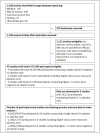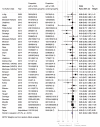This is a preprint.
Vitamin D supplementation to prevent acute respiratory infections: systematic review and meta-analysis of aggregate data from randomised controlled trials
- PMID: 33269357
- PMCID: PMC7709175
- DOI: 10.1101/2020.07.14.20152728
Vitamin D supplementation to prevent acute respiratory infections: systematic review and meta-analysis of aggregate data from randomised controlled trials
Update in
-
Vitamin D supplementation to prevent acute respiratory infections: a systematic review and meta-analysis of aggregate data from randomised controlled trials.Lancet Diabetes Endocrinol. 2021 May;9(5):276-292. doi: 10.1016/S2213-8587(21)00051-6. Epub 2021 Mar 30. Lancet Diabetes Endocrinol. 2021. PMID: 33798465
Abstract
Background: A 2017 meta-analysis of data from 25 randomised controlled trials of vitamin D supplementation for the prevention of acute respiratory infections revealed a protective effect of the intervention. Since then, 20 new RCTs have been completed.
Methods: Systematic review and meta-analysis of data from randomised controlled trials (RCTs) of vitamin D for ARI prevention using a random effects model. Pre-specified sub-group analyses were done to determine whether effects of vitamin D on risk of ARI varied according to baseline 25-hydroxyvitamin D (25[OH]D) concentration or dosing regimen. We searched MEDLINE, EMBASE, the Cochrane Central Register of Controlled Trials (CENTRAL), Web of Science and the ClinicalTrials.gov registry from inception to 1st May 2020. Double-blind RCTs of supplementation with vitamin D or calcidiol, of any duration, were eligible if they were approved by a Research Ethics Committee and if ARI incidence was collected prospectively and pre-specified as an efficacy outcome. Aggregate data, stratified by baseline 25(OH)D concentration, were obtained from study authors. The study was registered with PROSPERO (no. CRD42020190633).
Findings: We identified 45 eligible RCTs (total 73,384 participants). Data were obtained for 46,331 (98.0%) of 47,262 participants in 42 studies, aged 0 to 95 years. For the primary comparison of vitamin D supplementation vs. placebo, the intervention reduced risk of ARI overall (Odds Ratio [OR] 0.91, 95% CI 0.84 to 0.99; P for heterogeneity 0.01). No statistically significant effect of vitamin D was seen for any of the sub-groups defined by baseline 25(OH)D concentration. However, protective effects were seen for trials in which vitamin D was given using a daily dosing regimen (OR 0.75, 95% CI 0.61 to 0.93); at daily dose equivalents of 400-1000 IU (OR 0.70, 95% CI 0.55 to 0.89); and for a duration of ≤12 months (OR 0.82, 95% CI 0.72 to 0.93). No significant interaction was seen between allocation to vitamin D vs. placebo and dose frequency, dose size, or study duration. Vitamin D did not influence the proportion of participants experiencing at least one serious adverse event (OR 0.97, 95% CI 0.86 to 1.09). Risk of bias within individual studies was assessed as being low for all but three trials. A funnel plot showed left-sided asymmetry (P=0.008, Egger's test).
Interpretation: Vitamin D supplementation was safe and reduced risk of ARI, despite evidence of significant heterogeneity across trials. Protection was associated with administration of daily doses of 400-1000 IU vitamin D for up to 12 months. The relevance of these findings to COVID-19 is not known and requires investigation.
Funding: None.
Conflict of interest statement
Competing Interests
All authors have completed the ICMJE uniform disclosure form. No author has had any financial relationship with any organisations that might have an interest in the submitted work in the previous three years. No author has had any other relationship, or undertaken any activity, that could appear to have influenced the submitted work.
Figures


References
-
- Jolliffe DA, Griffiths CJ, Martineau AR. Vitamin D in the prevention of acute respiratory infection: systematic review of clinical studies. J Steroid Biochem Mol Biol 2013; 136: 321–9. - PubMed
-
- Li-Ng M, Aloia JF, Pollack S, et al. A randomized controlled trial of vitamin D3 supplementation for the prevention of symptomatic upper respiratory tract infections. Epidemiol Infect 2009; 137(10): 1396–404. - PubMed
Publication types
Grants and funding
LinkOut - more resources
Full Text Sources
Medical
